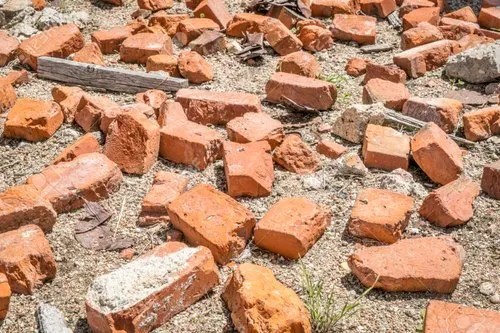Sometimes the writing feels like throwing chunks of broken bricks into an abandoned lot. I pass by that lot every day, usually on my way to and from someplace else. I pass by so many times, in fact, that sometimes I don’t even notice the abandoned lot. Or I forget it’s even there.
Sometimes wild animals are stalking through that lot — rats and possums and feral cats. Sometimes kids are loitering in the lot, skipping school, avoiding the cops, maybe kicking around a soccer ball or passing around a spliff.
Every day I pass by the lot carrying a chunk of brick in my hand. Maybe it makes me feel safer. That feral cat might attack me. That kid with the hoodie and the knife might chase me down the block. Maybe it just gives me something to do, a way to pass the time. Whatever the reason, I have the brick, and I chuck it over the chain link fence. It lands with a satisfying thud in the dirt.

Every day, the lot, the brick, the fence, the dirt.
One day, I walk past the lot and see a whole pile of bricks in there. Hundreds of them. The rats are using them for shelter, little rat and possum condominiums.
Somebody could build something with all those bricks. A wall maybe. Few more days, and maybe there’ll be enough for a whole house. Might as well clean out the rats while I’m at it. And call the cops to round up the juvenile delinquents.
That’s how the writing goes sometimes. Some days it’s easy, some days it’s rough. Like lugging around bricks. Like chucking them over fences into abandoned lots. I read a quote recently by Steven Pressfield, author of The War of Art:
“There’s a secret that real writers know that wannabe writers don’t, and the secret is this: It’s not the writing part that’s hard. What’s hard is sitting down to write.“
The hardest part about writing, for me anyway, is writing when I don’t want to. (That topic probably warrants a post all by itself — an exploration of all the many reasons we don’t want to write, even if we really want to.) I think that’s what Pressfield is saying, and I agree with him. Real writers write, even when they don’t want to. The question is … how? (Another rabbit hole worth exploring in some future post.)
For the sake of brevity here, suffice it to say (sufficeth to say?) those chunks of bricks you keep slinging around — as ugly and worthless as they may seem individually — might actually be quite valuable one day collectively, if you just keep at it day in and day out. You have to put in the work and the time, as hard as that might seem, and as unproductive as you think it might be going, especially on the days when it’s hardest. You’re working towards something, even if you’re not quite sure at the time what that something might be.
There’s another reason to keep at it, even if it’s hard, especially when it’s hard. If you avoid walking past the abandoned lot because it’s scary — if you’re afraid of the feral cats, if you’re afraid of that gang of shady-looking teenagers, if you’re afraid you might snag your jeans on that rusty fence — then you’re letting fear control you. You’re letting fear win. And we cannot let that happen. We cannot let fear win.
Another person I love listening to for all things writing-related is Abbie Emmons. She has a fantastic YouTube channel. In one video, she talks about feeling motivated to write and this idea of not giving in to fear. Go watch the whole thing here if you like. It’s a really great eleven-minute investment of your time, I promise. One thing she mentions that really struck me is this:
“When you [give in and quit writing], you are literally training your brain to listen to fear and obey it.”
— Abbie Emmons
Again, we cannot let that happen. We cannot let fear rule us. So write anyway, even when it’s hard. Don’t let fear ruin something that you love.
No, it won’t always be fun. It won’t always be exciting. It won’t always feel satisfying and rewarding and fulfilling. You won’t always succeed, even if you work really really hard. There’s never any guarantee for success. On the other hand, if you always quit, you are guaranteed to always fail. So keep at it and, one day, you just might find that you’ve collected enough bricks to build a whole house in that old abandoned lot. Now keep it clean, and don’t let those kids squat in there. And don’t let those nasty feral cats spray their stink all over the carpet.


The first draft is just telling yourself the story. 😉
True dat